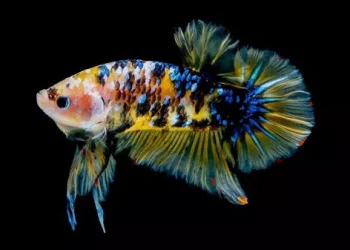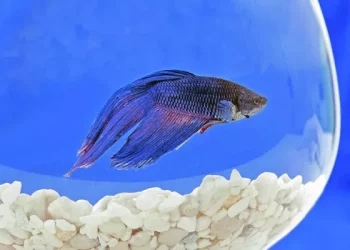Betta fish, also known as Siamese fighting fish (Betta splendens), are one of the most popular species in the aquarium hobby due to their vibrant colors and captivating behavior. Known for their aggressive nature and beautiful fins, these fish require specific care to thrive in captivity. One behavior that often raises questions among betta owners is whether betta fish rest on the bottom of their tank. In this comprehensive article, we will explore the reasons behind this behavior, its implications for their health, and how to ensure your betta remains healthy and happy.
Understanding Betta Fish Behavior
Natural Habitat and Behavior
Betta fish originate from Southeast Asia, specifically the slow-moving waters of Thailand, Cambodia, Laos, and Vietnam. In their natural habitat, they inhabit shallow ponds, rice paddies, and slow-moving streams with dense vegetation. Bettas are known for their labyrinth organ, which allows them to breathe atmospheric air, making them well-suited to oxygen-poor environments.
In the wild, bettas display a range of behaviors that are essential for their survival. They use their vibrant colors and fin displays to attract mates and establish dominance. They also exhibit territorial aggression, which is why they are often kept alone in captivity.
Behavior in Captivity
In an aquarium setting, bettas can display a range of behaviors that might differ from those observed in the wild. Their interactions with their environment, including their choice of resting spots, can be influenced by various factors such as tank size, water quality, and temperature.
Do Bettas Rest on the Bottom?
Observing Bottom Resting
Many betta owners have observed their fish resting on the bottom of the tank. This behavior can be perplexing, especially if it contrasts with the more active and upright swimming behavior that bettas are known for. To understand why bettas might rest on the bottom, it’s important to consider several factors:
Resting Behavior: Bettas, like many fish, do need periods of rest. In their natural habitat, they might rest near the bottom among vegetation or substrate. In captivity, they may choose the bottom of the tank as a resting place, especially if other resting spots are not available.
Tank Conditions: Poor water quality, inadequate temperature, or lack of hiding places can lead to abnormal resting behavior. If a betta is frequently found resting at the bottom, it might be an indication of suboptimal tank conditions.
Health Issues: Resting at the bottom can also be a sign of health problems. Bettas suffering from illnesses such as swim bladder disorder, parasites, or other diseases may spend more time at the bottom of the tank.
Normal vs. Abnormal Behavior
To determine if bottom resting is normal or a sign of concern, observe the following aspects of your betta’s behavior:
Frequency and Duration: If your betta occasionally rests on the bottom but is otherwise active and alert, it is likely normal behavior. However, if the fish spends most of its time at the bottom and appears lethargic or unresponsive, it could be a cause for concern.
Physical Condition: Check for any visible signs of illness such as changes in color, unusual growths, or frayed fins. Also, monitor for behavioral changes like reduced appetite or difficulty swimming.
Water Quality: Regularly test the water parameters such as temperature, pH, ammonia, nitrite, and nitrate levels. Bettas are sensitive to poor water quality, which can lead to stress and health issues.
Common Reasons for Bottom Resting
Temperature Fluctuations
Betta fish thrive in stable temperatures between 76-82°F (24-28°C). Temperature fluctuations or water that is too cold can cause lethargy and result in the betta resting at the bottom. A heater with a reliable thermostat can help maintain a consistent temperature.
Poor Water Quality
High levels of ammonia, nitrite, or nitrate, as well as low oxygen levels, can stress bettas and lead to abnormal behavior. Regular water changes and a good filtration system are essential to maintain water quality.
Swim Bladder Disorder
Swim bladder disorder is a common condition in bettas that affects their ability to control buoyancy. This can cause the fish to float erratically or struggle to stay upright, leading them to rest on the bottom. Causes of swim bladder disorder can include overfeeding, constipation, or infections.
Stress and Aggression
Bettas are solitary and territorial fish. They can become stressed if they are in a tank with other aggressive or incompatible species. Stress from overcrowding or constant interaction with other fish can lead to abnormal resting behavior.
Illnesses and Parasites
Various illnesses and parasites can affect bettas, causing them to rest on the bottom. Common issues include fungal infections, bacterial infections, and external parasites such as ich. Observing other symptoms like discoloration, lesions, or changes in behavior can help diagnose these conditions.
See Also: How Often Do You Feed a Betta Fish Flakes?
Ensuring a Healthy Environment for Your Betta
Tank Setup and Maintenance
To promote optimal health and reduce the likelihood of your betta resting at the bottom due to environmental factors, consider the following:
Tank Size: A minimum tank size of 5 gallons is recommended for bettas. Larger tanks provide more stable water conditions and space for swimming.
Filtration and Water Changes: Use a gentle filter and perform regular water changes to keep the water clean and reduce stress on your betta.
Heating: Install a heater with a thermostat to maintain a stable temperature. Avoid placing the tank in drafty areas or near heat sources.
Decor and Hiding Spots: Provide plenty of hiding spots and resting areas using aquarium plants, rocks, and other decorations. Ensure the betta has options for resting both near the surface and near the bottom.
Diet and Feeding
A balanced diet is crucial for maintaining your betta’s health. Feed a high-quality betta food that contains the necessary nutrients and avoid overfeeding. Overfeeding can lead to constipation and swim bladder issues.
Regular Health Checks
Regularly inspect your betta for signs of illness or distress. Address any health issues promptly with appropriate treatments and consult a veterinarian if necessary.
When to Seek Professional Advice
If you notice that your betta is consistently resting at the bottom and exhibiting other signs of distress, it may be time to seek professional advice. A veterinarian specializing in fish or aquatic animals can provide a thorough examination and recommend appropriate treatments.
Conclusion
In summary, bettas may rest on the bottom of their tank for various reasons, including natural behavior, environmental conditions, or health issues. While occasional bottom resting can be normal, frequent or prolonged behavior may indicate problems that need addressing. By maintaining a healthy tank environment, providing a balanced diet, and monitoring your betta’s health, you can ensure that your fish remains active, vibrant, and content.
Understanding your betta’s behavior and responding to its needs will help you provide the best care possible, allowing your beautiful fish to thrive in its aquatic home.
Related Topics:

























